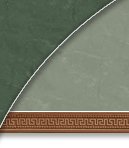A Complete Tutorial for learning the Eight Tones
This section provides:
- a Complete Tutorial for singing the stikheron and troparion melodies for the Eight Tones,
- combining textual instructions with example recordings of each tone for you to follow along with,
- with the goal of teaching, by example, how to sing Orthodox liturgical music in English.
- See our Endorsements page for reviews of this unique Tutorial.
NOTE: There is a full description of the 8 tones in the Introduction to the Church Singer's Companion, Section VI: Stikheron and Troparion Melodies.
|
HYMNS: ________________________ TONE 1: The tone 1 sticheron melody has five phrases. Phrases 1 through 4 are used in rotation as the text requires. Phrase 5 is used for the last phrase of text.
________________________ TONE 2: The melody for tone 2 sticheron has four phrases. Phrase 1 is used for the first phrase of text. Phrases 2 and 3 are used in alternation as the text requires. Phrase 4 is used for the last phrase of text.
|
TONE 3: The melody for tone 3 sticheron has three phrases. Phrases 1 and 2 are used in alternation as the text requires. Phrase 3 is used for the last phrase of text.
________________________ TONE 4: The sticheron melody for tone 4 has six phrases. Phrases 1 and 2 are used for the first two phrases of text. Phrases 3 through 5 are used in rotation as the text requires. When phrase 3 recurs after phrase 5, it begins on the reciting note.
The troparion melody for tone four consists of a pair of melodic phrases, repeated as the text requires. The second phrase of the pair is set to the second to last text phrase, and a third phrase is set to the last text phrase. Texts in this tone must be divided into an odd number of phrases not less than three to keep the integrity of the melody.
________________________ TONE 5: The sticheron melody for tone 5 has four phrases. Phrases 1 through 3 are used in rotation as the text requires. Phrase 4 is used for the last phrase of text. As with tone 4, do not over-stretch the melismatic flourish in phrase 3.
For troparion texts in the fifth tone, the sticheron melody is used.
|
TONE 6: The sticheron melody for tone 6 has four phrases. Phrases 1 through 3 are used in rotation as the text requires. Phrase 2 ends with a descent if it is used for the second-to-last phrase of text.
The tone 6 troparion melody consists of a pair of phrases repeated as the text requires. This structure requires texts to be divided into an even number of phrases (i.e., phrase 2 is the last phrase.)
________________________ TONE 7: The sticheron melody for tone 7 has three phrases. Phrases 1 and 2 are used in alternation as the text requires. Phrase 3 is used for the last phrase of text. As with tone 3, the simplicity of this melody sets in relief some common characteristic features. It is the least used of the sticheron melodies.
The troparion melody for tone seven consists of a pair of phrases repeated as the text requires. This structure requires texts to be divided into an even number of phrases. The second phrase of the final pair is varied.
________________________ TONE 8: The sticheron melody for tone 8 has four phrases. Phrases 1 through 3 are used in rotation as the text requires. When phrase 1 recurs after phrase 3, it begins on the reciting note. Phrase 4 is used for the last phrase of text.
The troparion melody for the eighth tone consists of one phrase repeated as needed. Care should be used in dividing a text so the phrases are not too short. A sort of nursery-see-saw effect will result. In fact, particular care in the execution of this melody should be taken in order to avoid this problem.
|












